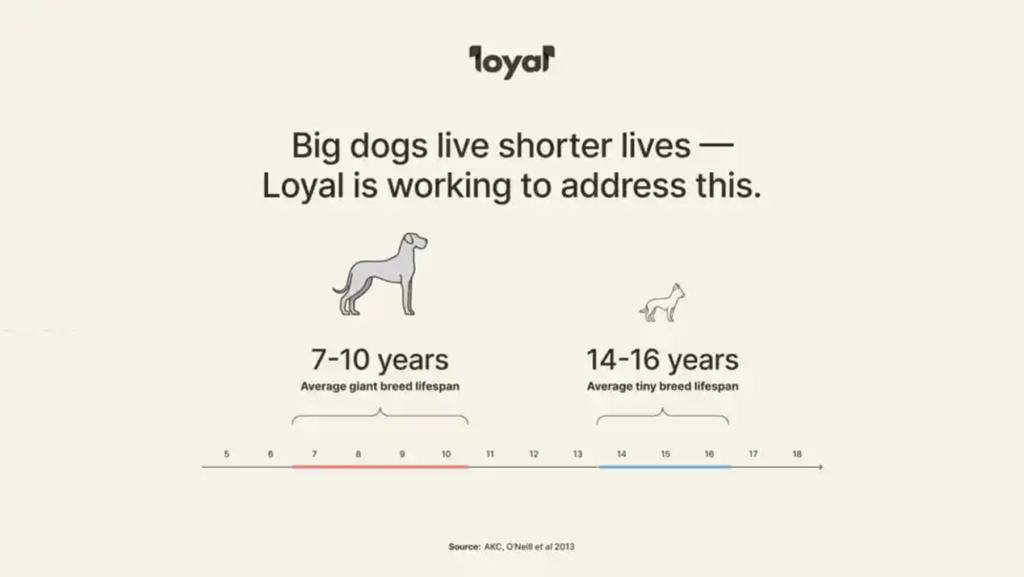Pawsitively Groundbreaking: Life-Extending Drug for Dogs Clears FDA Hurdle
Loyal, the San Franciso-based veterinary biotech firm, has achieved a significant milestone as its lifespan-extending drug (LOY-001) for large dogs moves closer to obtaining FDA approval.
Highlights:
- Loyal’s unpublished research suggests LOY-001 increases lifespan in large dog breeds.
- By 2026, Loyal hopes to secure conditional approval from the FDA, allowing them to bring the drug to market while still conducting additional comprehensive lifespan experiments.
When it comes to our beloved four-legged friends, we find ourselves grappling with the inevitable reality that we will one day have to bid them farewell. And we are faced with the challenging task of accepting that they will no longer be at our sides, eagerly waiting for some affectionate belly scratches and tender forehead kisses. Yet, with many scientists dedicated to giving us more years with our furry companions, we’ve finally reached a critical milestone in the quest for an effective life-extending drug for dogs.
On November 28, 2023, the San Franciso-based veterinary biotech firm, Loyal, received a letter from the United States Food and Drug Administration (FDA) stating that “the data you provided are sufficient to show that there is a reasonable expectation of effectiveness,” signaling a pivotal moment for Loyal’s novel drug LOY-001.
Celine Halioua, the founder and chief executive of Loyal, stated, “I’m so proud to announce that Loyal has earned what we believe to be the FDA’s first-ever formal acceptance that a drug can be developed to extend lifespan. In regulatory parlance [from a drug regulation perspective], we have completed the technical effectiveness portion of our conditional approval application for LOY-001’s use in large dog lifespan extension.”
This announcement has sparked excitement among many dog owners, but it is important to note that before LOY-001 can reach the market, Loyal must meet the FDA’s safety and manufacturing protocols as well as provide definitive data showcasing LOY-001s ability to effectively prolong the lifespan of large dogs. That being said, the data Loyal has gathered shows promising signs of addressing the “big dog, short lifespan” phenomenon.

How It Works
Although Loyal has yet to release the full details behind their proprietary product, their unpublished research suggests that LOY-001 “improves clinically relevant aging parameters” and works by modulating the growth-related hormones insulin and insulin-like growth factor-1 (IGF-1), which have several ties to aging and longevity. In fact, studies across multiple model organisms suggest that reduced IGF-1 levels are correlated with increased healthy lifespan (also known as healthspan). Conversely, high IGF-1 levels have been associated with increased mortality risk and accelerated aging.
Remarkably, larger dogs may exhibit IGF-1 levels up to 28 times higher than their smaller counterparts. Accordingly, Loyal’s observational study of nearly 500 dogs found that higher insulin levels were correlated with increased frailty and lower quality of life. So by reducing IGF-1, LOY-001 stands to address what’s believed to be the primary driver of accelerated aging in large dogs.
What Else is Out There?
LOY-001 isn’t the only health intervention in the pipeline for our canine buddies. Uniquely, researchers at the Dog Aging Project are exploring the longevity-promoting effects of rapamycin, a compound that works by targeting a protein called mTOR – a key modulator of cellular growth, proliferation, and survival.
Rapamycin has been shown to increase the lifespan of multiple model organisms and notably mimics the effects of caloric restriction, one of the few well-established interventions for promoting increased lifespan. Interestingly, in a small randomized, placebo-controlled, clinical trial of 17 dogs, 27% of dog owners whose pets were administered low-dose rapamycin for six months reported positive changes in health or behavior. So while the preliminary findings are encouraging, additional research is needed to determine whether rapamycin can actually extend the lifespan of large dog breeds.
Staying Pawsitive
The path toward bringing these canine interventions to the market will be a long and arduous journey, requiring more rigorous testing and thorough lifespan studies to instill confidence in all dog owners. But at the end of the day, dog owners should consult with their veterinarian before hopping on novel treatments. So as we wait for these interventions to come to fruition, let us remain pawsitive and give our furry best friends the life they deserve.

